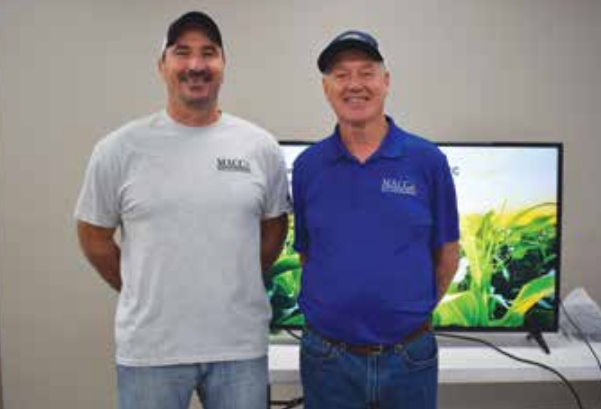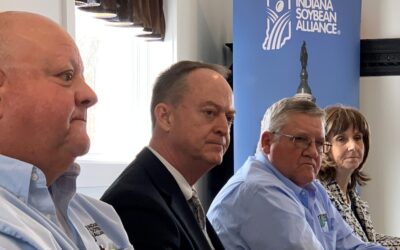Kalb’s crop consultation program attracts clients from across the world

Kalb, at left, stands next to Terry Vissing, who partners with him
in directing MACC.
BY EMMA HOPKINS-O’BRIEN
Few farmers truly achieve celebrity status. However, one southern Indiana farmer’s success at a national level is bringing new opportunities. Kevin Kalb of Dubois, Ind., is gaining fame by winning multiple National Corn Yield Contests hosted by the National Corn Growers Association (NCGA) year-after-year.
That success has led Kalb and his friends to open a crop consultation program, and he is featured in a television show. As it turns out, growing a 409 bushel-per-acre corn yield will do that to a person.
“Live to Farm” is the show that features Kalb’s family on the RFD-TV and Discovery channels – thanks to his corn celebrity status.
On a more serious note, Midwest Advanced Crop Consulting (MACC) is the program Kalb has put together with the help of Terry Vissing to share his wisdom and recipes on growing high-yield corn and soybeans. MACC was founded on the brink of the COVID-19 pandemic, which caused the program to inadvertently lock itself into a mostly internet Zoom-based format, because MACC now has clientele quite far from Indiana. In January, Kalb and Vissing met in-person with a group of farmers in Dubois County to give new and perspective clients a feel for what goes on in the program.
“We have people enrolled in probably 30-35 states,” Vissing said. “And we’ve got a Canadian fellow here today, and we’ve got two South Africans who are involved – and we’ve got a French guy who actually farms in Ukraine now.”
MACC is a three-year, membership-based group that meets by Zoom about three months during the planting season along with an in-person winter meeting. The program also includes at least one, big field day during the cycle in which members observe some of Kalb’s own fields. Being a 14-time winner of the NCGA’s National Corn Yield Contest, it’s easy to see why other farmers would want in on Kalb’s formula for success. He currently operates his family’s five-generation farm under the name Kevin Kalb Farms, where he raises turkeys along with corn and soybeans in Dubois County. Vissing, who works alongside Kalb in public relations for MACC, farms corn and soybeans in Marysville, Ind.
Sharing his knowledge
Having accomplished his own goals for producing corn, Kalb decided to spread the wealth, so to speak, in 2019. He created MACC to spare other farmers the mistakes he made to get to the current level of his operation.
“I became pretty good friends with Terry Vissing, and we were just talking about the national contest and how much we learned from it, and all the mistakes that we made,” Kalb said. “We thought maybe we could go out and help other farmers get to where we’re at. So, we share our knowledge a little bit. Instead of taking some of the other guys 10-15 years to learn what we have, we try to teach them in two or three years.”
MACC relies heavily on two techniques: The use of liquid fertilizer and an analysis of leaf tissue samples to track the plant’s nutritional needs.
“So many of us were always taught by the universities to use dry fertilizers, but Kevin has found that the salts in the dry fertilizers are damaging the hair roots on the corn and keeping the yields down,” Vissing said. “We see guys here all the time restricting themselves and spending lots of money on dry fertilizers, and they don’t realize that it’s not getting up into their plant.”
Using a particular leaf from the plant, Kalb takes tissue samples once per week during the growing season to see if plants are pulling in the nutrients they need, thus making sure they are feeding the plant rather than just the soil.
Another “secret” in Kalb’s high-yield formula is the use of humic acids. These are extracts of the organic compounds that exist in humus — the major organic fraction of soil. Kalb and Vissing describe the effect on the soil as it being able to “breathe” better and lower levels of compaction.
“The fertilizer that you put out there — you just can’t put it out there and it miraculously goes into the corn plant,” Kalb explained. “It takes biology to do that, so we’re actually feeding our soil biology with the humics — the carbon and the sugars to stimulate them.”
Less inputs, especially fertilizer
Kalb’s formula cuts down on inputs, particularly where fertilizer is concerned. He says his fields are now down to using only half a pound of nitrogen per bushel of corn. He then uses those savings to spend on sugars and humics.
His program aims not to spend more money on crop inputs, but to cut down on some inputs and use the savings to spend on more contributions to soil life and biology that will enable the fertilizer to get swiftly where it needs to go. This way of encouraging soil health is environmentally friendly, as it improves and nurtures life in the soil rather than degrading it, Kalb explained.
“I think the advantage learning from us, and our group, is we make a living farming ourselves,” he said. “I mean I don’t know how you can learn better than from farmers that are trying to make money and be the most efficient they can. Chasing high yields is great, but you’ve got to make money doing it and address the soil biology.”
David Wolmack, who is in his third year of MACC, has seen marked improvement in his yields and stood in front of the 30 or so newbie MACC clients to prove it by sharing his yield results and tissue samples.
“One thing you’ll learn in this group is that stuff that’s been true for the last 50-70 years is not true anymore,” Wolmack said. “Even 10 years ago, if you talked to people planting corn in April, they would say that’s too late. And now we’re planting corn in June. Two years ago, I planted the first field of corn I’d ever planted on June 2. And it was one of the best yields of corn I’ve ever had.”
Wolmack’s father, who had been 88 years old at the time, said he had never seen corn yields like that in his life. Kalb said what sets MACC apart from other consultation programs is the concept of farmers teaching farmers — every grower in the group is willing to give up information such as what they see on their farm that works or does not work, and together they analyze it.
“For one thing, everybody gets to see not just our high yield recipe that we use, but they get to see our average tissue samples,” Kalb said. “They get to see 100 percent of everything that we do on our farm to help make us successful. We teach them why we use it and help them understand why we do what we do and how much more economic they can be with their fertilizers.”
Growers can learn more about the MACC program by going online to www.midwestadvancedcrop.com
Posted: March 20, 2023
Category: ICGA, Indiana Corn and Soybean Post - Winter 2023




